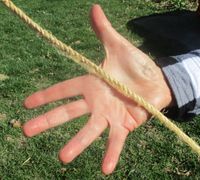The Greek verb luō can mean either “loosen” or “destroy.” It’s the verb most often used by textbooks to teach the Greek verb system, because it is so easy to learn. But it is important to keep both meanings of this verb in mind when we read what Jesus says to Peter in Matthew 16:19: “Whatever you loosen (or is it “destroy” or “abolish”?) on earth shall be loosened (destroyed? abolished?) in heaven.” (See also Matthew 18:8.)
So what does Jesus mean here? (We must depend, of course, on the Greek Matthew used to transmit whatever Jesus said in Aramaic.) Does Jesus mean “loosen” i.e. “permit”? Or does he mean “destroy / abolish”? It depends partly on the meaning of “bind,” which Jesus appears to be using as the opposite of luō. “Bind” (deō) has no double meaning, although it is not entirely clear whether binding means forbidding, or making decisions that are “binding.”
Let’s take a look at how luō is used in the rest of the New Testament, and see how it affects how we read Jesus’ words to Peter on the decisions Peter makes for the future of his church.
The basic meaning “loosen” is used for untying Jesus’ sandals (Mark 1:7), untying the donkey on Palm Sunday (Matthew 21:2), and unbinding the risen Lazarus from his graveclothes (John 11:44). It is used for releasing Paul from bondage (Acts 22:30), releasing angels that are tied up (Revelation 9:14), and even releasing Satan from his thousand years of bondage. The verb is also used for releasing the crippled woman from her handicap (Luke 13:16), and being released from marriage to a spouse (1 Corinthians 7:27).
A few times that luō is used are hard to classify. Revelation 5:2 uses it to speak of “breaking” seals on a scroll, i.e. opening the scroll to see its contents. In Acts 13:43, we are told that a synagogue service “broke up,” releasing worshippers to leave. And twice the verb is used to speak of “breaking” the Sabbath, which could mean “loosening” it by setting it aside as a law by which one is “bound,” or “invalidating” the law (see below).
In other passages, luō or “loosen” clearly means “destroy.” Such is the case I n John 2:19, “Destroy this temple.” In Paul’s shipwreck in Acts 27:41, the boat’s stern is “broken” by the surf. In Ephesians 2:14, Christ “breaks / destroys” the barrier between Jew and Gentile. In 1 John 3:8, Christ came to “destroy” the works of the devil. And in 2 Peter 3:10-12, we are told that the heavens and the earthly elements will be “destroyed.” “Loosening” on steroids, we might say.
There are two key passages where luō is used to speak of “relaxing” or “breaking” God’s word. One is Matthew 5:19, where Jesus gives a stern warning to those who “relax” or “break” even the least of God’s commands and teach others to do so. This meaning is confirmed in verse 17, where a compound of luō is used (kataluō) to say that Jesus did not come to “abolish” the Law or the prophets. The other passage is John 10:35, where Jesus declares that “Scripture cannot be broken,” that is, contradicted or invalidated.
A textual corruption in 1 John 4:3 gives us an intriguing use of luō. The verse says that whoever “does not confess Jesus” (as having come in the flesh) is not from God. But a variant reading preserved by the Latin version and several early church writers reads “whoever destroys / loosens Jesus.” The meaning (which is certainly not based on the original text) seems to be a reference to the teaching of the Gnostics, who split Jesus into an earthly soul and a “heavenly” Christ-being who came down on Jesus at his baptism and abandoned him at the cross.
The two basic meanings of luō are echoed in the two compound verbs apoluō and kataluō. Apoluō means to set free or send away. Pilate tries to “release” Jesus (John 19:12 – the same verb is used several times for releasing a prisoner at Passover). Jesus “dismisses” the crowd he fed (Mark 6:45). The Ephesus city clerk likewise “dismisses” the crowd (Acts 19:40). This verb is also used for divorce (Matthew 1:19, Mark 10:2-11, Luke 16:18).
Kataluō means to destroy, dismantle, or abolish. It is used for references to the destruction of the Temple (Matthew 26:61, Mark 14:58, Acts 6:14). Paul uses it to speak of when our “earthly tent” (the body) is taken down (2 Corinthians 5:1). And we have already seen how kataluō is used in Matthew 5:17 to speak of “abolishing” the Law and the prophets.
Judging from Matthew’s use of the verb in Matthew 5:19 as he transmits Jesus’ teaching to us, where luō serves as the opposite of doing God’s commands, Matthew 16:19 does seem to use luō to mean “relax” or “permit.” So here we have Jesus declaring Peter to be the lead apostle or authorized representative of Jesus, with power of attorney to address issues of what is forbidden or permitted that Jesus did not address in his recorded teachings on earth.
It is not necessary for us to draw the conclusion that Jesus is creating an office of Pope, or an ongoing body of apostles who would continue to make such decisions for centuries to come. It is logical to see this authority as intended only as long as Peter (and perhaps the rest of the original apostles) remains on earth. Certainly the church's decision on circumcision was made this way. My hunch is that we find more such rulings included in the sin lists found in the Didachē, where abortion, witchcraft, filthy language (aischrologia), and child molestation, none of which are explicitly forbidden by Jesus, are spelled out as prohibitions by Jesus' authorized representatives.


